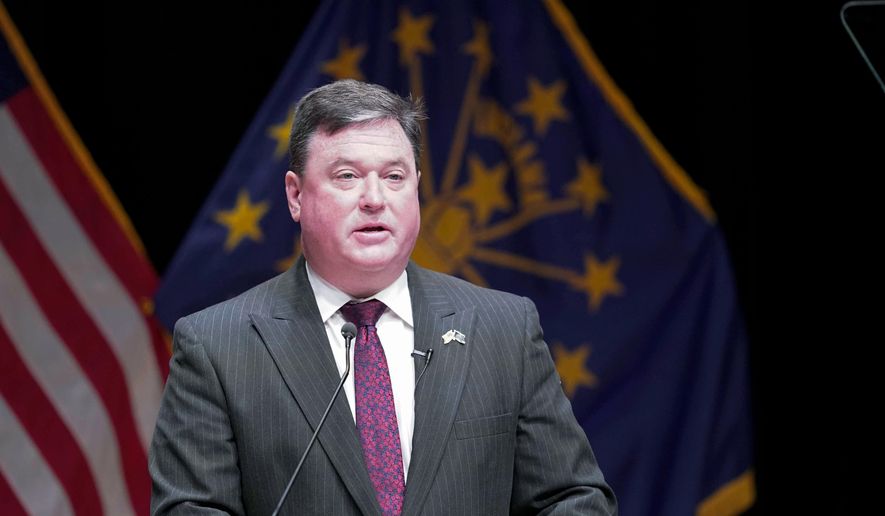INDIANAPOLIS (AP) - The conservative pushback over Indiana’s COVID-19 restrictions is turning into a tangled legal standoff among Republicans who dominate the Statehouse.
Gov. Eric Holcomb is arguing that the GOP-controlled General Assembly is violating the state constitution with a new law giving itself the power to call a special legislative session during emergencies and wants the courts to decide who is correct.
Some legal experts question legal arguments that Attorney General Todd Rokita - a past Holcomb political rival - filed with a Marion County court on Friday asking a judge to throw out the governor’s lawsuit because state law gives him alone the authority to determine whether the governor can even go to court.
Lawyers hired by the governor’s office over Rokita’s objections filed the lawsuit last week after lawmakers voted to override Holcomb’s veto of the bill allowing what the law calls an emergency session. Holcomb said he worried any action taken by the Legislature during such a session could be challenged as illegal and lead to “significant uncertainty” during a time of emergency.
While Rokita maintains the law is constitutional, long-standing legal precedents are that such disagreements between the governor and the Legislature should be decided by the courts, said former state Supreme Court Justice Frank Sullivan, who spent 19 years on the court after serving as a top official in Democratic Gov. Evan Bayh’s administration.
“I think that the attorney general is simply not correct in holding himself up as the arbiter of what the Indiana Constitution means,” Sullivan said. “That’s the job of the judicial branch.”
Republican legislators pushed the bill after criticism from many conservatives over the statewide mask mandate and other COVID-19 restrictions that Holcomb imposed by executive order with the General Assembly not meeting for about nine months after its 2020 session ended. Similar debates are occurring in states across the country.
Republican legislative leaders said they expected a court challenge to the emergency session plan. They’ve maintained that the measure wasn’t “anti-governor” and have praised Holcomb’s handling of the coronavirus pandemic, which health officials say has killed more than 13,000 people in the state.
Rokita said in a Friday statement that “the governor has done laudable work to shepherd our State through this pandemic.” But while campaigning last year as an unabashed supporter of then-President Donald Trump he said he supported curtailing the governor’s emergency powers and avoided defending Holcomb from critics of his coronavirus restrictions.
The attorney general’s office said Monday that Rokita wasn’t available for an interview about the dispute. Rokita’s office said in a statement that his “motivation for moving the court to strike this lawsuit is to protect the state’s legal interests, both short-term and long-term, independent of any one branch of state government.”
Holcomb’s attorneys at the Indianapolis law firm Lewis Wagner didn’t reply to requests for comment Monday about the attorney general’s filing. The governor’s office said last week it went ahead without Rokita’s consent because “we believe under the unique circumstance of this situation, that his approval is not necessary.”
Indiana University law professor Joel Schumm said Rokita faces an ethical conflict presenting himself as the lawyer for both sides of the dispute and the attorney general position “is not a superhero with godlike powers” under state constitutional law.
“I certainly hope (this case) doesn’t make law that the attorney general can decide if there’s a dispute between branches of government that he can resolve it himself and keep courts from being involved,” Schumm said.
Looming over the legal dispute is the intra-Republican Party fight between Holcomb and Rokita, who is widely seen as hoping to succeed the term-limited governor after the 2024 election.
Rokita’s win in last year’s attorney general race was a political comeback after giving up a U.S. House seat for a losing 2018 bid for the Republican U.S. Senate nomination. He also unsuccessfully sought the party’s 2016 nomination for governor to Holcomb after then-Gov. Mike Pence became Trump’s vice presidential running mate.
Another lawsuit, meanwhile, has been filed against the Legislature challenging the new law by retired Indianapolis attorney John Whitaker, who was a special counsel to Republican Gov. Robert Orr during the 1980s. His lawsuit filed Friday argues the courts should stop the Legislature’s “unconstitutional usurpation of the executive powers” that could result in “costs to taxpayers of unconstitutional legislative sessions.”
Rokita’s office argued that Holcomb’s lawsuit against legislators isn’t allowed to proceed now under the state constitution because the General Assembly technically is still in session despite concluding its regular business for the year on April 22. That’s because lawmakers passed - and Holcomb has signed - a bill extending the deadline for this year’s legislative session from April 29 until Nov. 15 because of delays in receiving census data so they can approve new congressional and legislative election districts.
Sullivan, the former state Supreme Court justice, said Holcomb has done all he could to prevent going from court by vetoing the emergency powers bill and that the lawsuit ban cited by Rokita doesn’t apply to actions done by lawmakers in their official roles.
“The point of this section of the Constitution is to prevent a person from interfering in the business of the Legislature by dragging a legislator into court during session such that the legislator couldn’t attend the session because he or she has to be in court,” Sullivan said. “That’s not what’s going on here.”




Please read our comment policy before commenting.